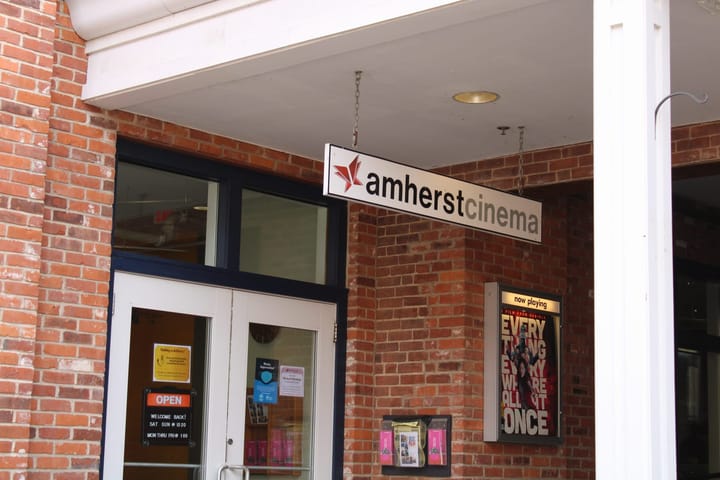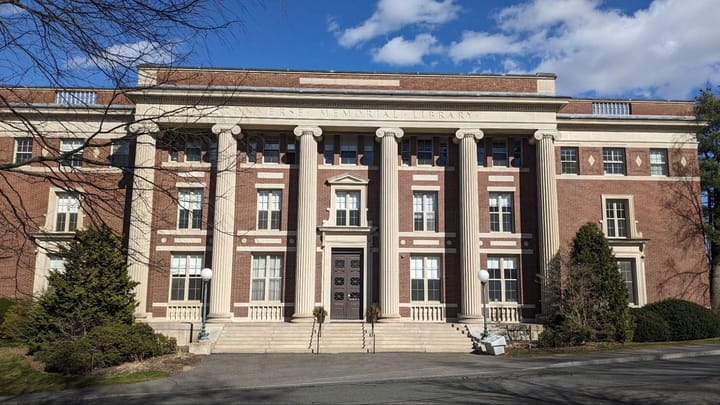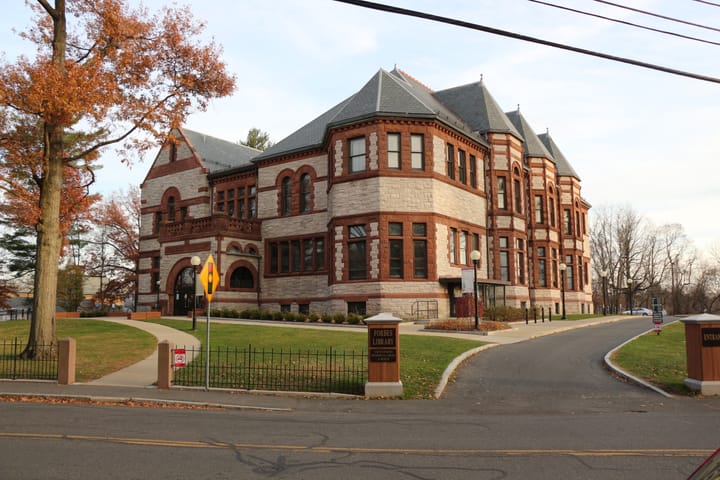Quinto navigates new domains
His interest in copyright and trademark law has allowed him to do such things as learn about spacecraft and attend the Academy Awards as an esteemed guest each year. A passionate traveler, Quinto has visited more than 110 countries. Modest about his accomplishments and enthusiastic about his life, Quinto said, “I may not have accomplished as much as many other alumni, but I’ve had a lot of fun.”
The good old days
The good old days
Quinto recalls Amherst fondly. As a political science and history double major, he recalls such courses as Early Modern Philosophy, Modern Philosophy, and Economic History.
Quinto has visited Amherst twice since his graduation. He said the biggest change on campus is the lack of recognized fraternities. “I’m told that this is a good thing,” he said, but he is skeptical because of his positive experiences as a member of a fraternity, Phi Gamma. “I came to Amherst with no intension of joining a frat,” he said. But because it was hard to get housing outside of a fraternity house, Quinto found a single with a private study in the Phi Gam house and eventually volunteered to join the welcoming fraternity.
“The fraternities were, from my point of view, very nice,” he said. Quinto did not think fraternities made the campus cliquish as students took classes and ate in Valentine together. Even with the addition of women to the fraternities in 1975, he felt the system still worked.
Phi Gam held onto their policy that any Amherst student could belong after the coeducation decision. There were already female members of Phi Gam and other fraternities by the time he graduated.
Quinto always knew he wanted to go to law school, though he thinks he made a mistake not considering other paths. After graduating from Amherst, he attended Harvard Law School and thought he wanted to practice private international law. However, he found international law not to his liking, and started over in big Los Angeles-based firm, where he stayed for two and a half years. Then he moved on again, this time to a small, dingy, downtown Los Angeles branch office of an unknown New York-based firm.
The firm did not seem particularly promising, especially because he was looking for a position dealing with copyright law. Though the only position available was in trademark law, he stayed with the firm through a split-up and has been with Quinn, Emanuel Urquhart, Oliver & Hedges, LLP ever since. “Within the legal profession, I think I have the best job that I could possibly have,” said Quinto.
Currently, Quinto specializes in entertainment, intellectual property and Internet litigation. His practice with intellectual property focuses on “copyright, trademark, trade secret, and Internet-related claims.” He especially enjoys trade secret cases, as he has no background in science and each case involves a new science or new industry to learn about.
The Internet revolution
The Internet revolution
Quinto started working on Internet cases a few years ago. Two of his Internet cases went to the Ninth Circuit Court, a first for his firm. Domain names, somewhat similar to trademarks, were a logical extension of his work. Yet he quickly realized that the Internet was a very interesting area to study for its differences from trademark law. He said Internet law is still developing as “courts stretch existing laws in trying to achieve equitable results.”
He pointed out that in contrast to trademark law, in which trademarks are real physical objects, Internet trademarks are located in metatags which the user cannot see but which enable the site to come up on searches for the trademark. Infringements occur when a site registers someone else’s trademark to prevent the real owner from using it. As there is no physical object to be seized by the real trademark owner, the issue becomes more complicated for the courts.
Among the new acts and laws is the Anticybersquatting Consumer Protection Act, which passed in Congress with a greater majority than the decision to enter WWII after Pearl Harbor. This act represents courts’ attempt to apply tests in consumer trade law to the Internet. In consumer trade law, the courts balance a number of factors including whether the potentially infringing good is the same or similar to the original good and whether the goods travel in the same circles of commerce. Courts use these tests to determine whether there could be confusion, the clear sign of infringement. The Anticybersquatting Consumer Protection Act uses different weighting for the various tests to draw the same final conclusion about possible confusion.
After discovering his interest in Internet law, Quinto wrote a 1000 page treatise, “Law of Internet Disputes,” with the support of his firm. The treatise discusses various issues such as domain name disputes, employer monitoring of employee e-mail messages, the legality of linking and hyper-linking, and defamatory statements on the Internet.” Because the laws are still developing, Quinto often feels that courts make mistakes. He is able to criticize the decisions and suggest improvements to existing conditions. The treatise requires annual updates, a project Quinto is working on now.
Quinto is also involved with non-Internet issues. Through what he calls “serendipity,” namely his relationship with a client from a trademark 1984 Olympics case, he represents the Academy of Motion Picture Arts and Sciences in copyright and trademark matters. Quinto helped determine that “Oscar” of the Academy Awards is not a public symbol and “should be given the strongest possible protection against infringement.” His position with the Academy allows Quinto a special seat each year at the Academy Awards, which he loves because he gets exposed to “the glamour of life in L.A.”
His responsibilities for the Academy include reviewing the speakers’ scripts to help the Academy avoid getting sued and representing the Academy if it is sued. In his capacity as trademark attorney, Quinto prosecutes companies that write ads with catch phrases such as “Oscar-quality service.” Quinto also helps the Academy prevent the sale or transfer of the nontransferable, exclusive Awards tickets. He laughingly said that members who are found to have transferred their tickets are subsequently referred to as “former members of the Academy.”
Quinto noted that since the Academy cracked down on ticket transfer, the price for transferred tickets has dramatically increased, a concept he learned in introductory economics with Heinz Kohler at Amherst. Professor Kohler taught that “as price goes up, there are new entrants into the market.” And “sure enough,” Quinto said, “people who wouldn’t dream of risking their Academy memberships for $1,500 were tempted to sell tickets for $25,000. So just when we thought we were eliminating the problem, we were disappointed by the confirmation that Professor Kohler was right.”
Quinto also represents the Lockheed Martin Corporation in the Skunk Works mark, in copyright and trademark issues. Skunk Works deals with “the neatest, coolest things that go up,” said Quinto, such as U2 planes, interplanetary spacecrafts and high-flying airplanes. Quinto enjoys learning the scientific aspects of flight and space travel, such as the fiber optics of an airplane, while representing the corporation.
Quinto’s passion for travel began after spending his college summers working in South America. In 1975, Amherst Dean of Students David Drinkwater fined Quinto for registering late, but he avoided the fine by explaining how he had been unable to leave Ecuador for many days due to the fighting around an attempted coup d’etat. He said, “After I described the bullets whizzing around the Plaza de Armas and the tanks assaulting the presidential palace, how could he fine me?”
Lessons from abroad
Lessons from abroad
By the time Quinto graduated from Amherst, he had visited every country in South America. Then, for eight months after college, Quinto took a trip around the world made possible by a Rotary Graduate Fellowship. He said, “I recommend to everyone that they apply for Rotary fellowships.” He has since traveled to more than 110 countries, with stories to tell from each trip.
One year, on sabbatical to West Africa, Quinto was in a bar in Timbuktu and saw a boy wearing an Amherst T-shirt. The boy, who had received the T-shirt as a present, was handicapped by polio because the country had not started giving polio vaccines when he was a young child.
Another time, in Abigan, Quinto was wearing an Amherst T-shirt and was approached by a native. The man had heard of Amherst, an excellent American college, and asked Quinto to help his brother apply to Harvard business school, which he gladly did.
Quinto loves to travel whenever he can. “The world is a wonderful place-it is worth getting to know,” said Quinto. He is always overwhelmed by the welcoming kindness of people all over the world, even those who do not like American government.
Quinto grew up in Arizona. He met his wife, Juann Wen, while she was doing post-doctoral work in molecular biology at UCLA after studying in her native China. The couple took their honeymoon to Madagascar and Botswana, where they visited the Okavango Delta and a famous game park. They had their first child, a daughter, in 2001.





Comments ()